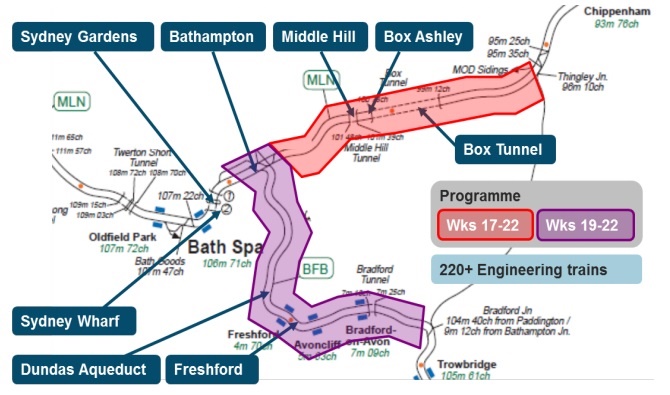04.08.15
Network Rail starts ‘critical stage’ of Bath electrification works
Network Rail workers have started lowering the tracks through Dundas Aqueduct, Bathampton Junction and Sydney Gardens as part of preparations for Bath’s railway line electrification.
Part of this stage of works includes preserving the 19th century listed aqueduct’s historical value.
Andy Haynes, Network Rail’s project director for the west of England, said: “Our work through the historic monument that is Dundas Aqueduct requires special measures, which is why we have worked closely with Bath and North East Somerset Council and Historic England to ensure we preserve its historic architecture.”
He commended the patience and understanding of passengers and added: “The completion of this track lowering work will mean the residents of Bath will be a step closer to experiencing the benefits of electrification and the new faster, longer, quieter and greener electric trains.”
Gauge clearance works are set to run from 18 July to 31 August.

This is a “critical” stage of the electrification process that comes after last week’s works, during which the team lowered the main line that runs towards London Paddington through Box Ashley and Middle Hill Tunnel.
They are continuing to lower the same line through Box Tunnel, having now reached the Corsham end.
Workers will also revisit these locations in a couple of weeks to lower the main line that runs towards the south west.
The second phase of work will see the closure of lines between Westbury and Bathampton Junction, affecting services to Bath from Westbury, Freshford, Avoncliff and Chippenham. Journeys from London to Bath will be diverted via Bristol Temple Meads station.
All work is due to be completed by 1 September.
We reported in our May edition that Patrick Hallgate, managing director of the Western route for Network Rail, said this summer’s works at Bath were one of the biggest jobs that they have ever done, in terms of engineering resources.
Summer work at the location is requiring 234 engineering trains for a six-week job, smashing the previous record at Nottingham.